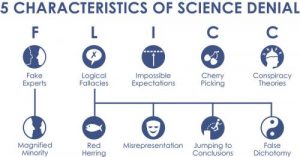The Self-Destructive Denial of Climate Change

Denialism has always been synonymous with human nature; that is, any definition of “human nature” would need to include this frailty. We follow our confirmation bias to defy reality and challenge evidence that is widely accepted by society.
The term climate change evolved before from what was known in the 1980s as “Global Warming.” The rise of an increasingly globalized economy spurred several multinational corporations— like Exxon—to undertake studies which yielded findings that there could be catastrophic consequences on the environment if businesses (like their own) continued to operate in an unregulated race for profit-at-any cost. That happened in an unprecedented era in the United States. The rise of modern day conservatism, Tea Party don’t-tread-on-me politics, began in earnest with the election of Ronald Reagan who introduced the concept of Reaganomics, which is synonymous to corporatism and deregulation. It would be both paradoxical and polarizing to understand the drastic shift that the Republican Party took in defying, then accepting, then defying again appropriateness of governmental business regulation, especially after Richard Nixon took the lead in founding the Environmental Protection Agency—and later stymied by Ronald Reagan Administration.
Denying visible, tangible reality is a dicey business, even for the modern American conservative. It makes the party look like a death cult. So Republican climate-communication strategy has undergone something of an adjustment.
Denying human responsibility for climate change is climate change denial. Human responsibility is the whole point. It is the heart of the matter. That is precisely what the much-discussed scientific consensus is a consensus about. Denying it — or muddying it up, saying “many scientists would debate the percentage [that] is contributable to man versus normal fluctuations” — is what we mean when we talk about denialism. Denying anthropogenic climate change allows one to evade the moral responsibility to do something about it, says Keith Kahn-Harris.
It’s just not true that “many scientists” debate the human contribution to climate change. Climate scientists are effectively certain that human beings are responsible for most or all of the warming over the past few centuries. (Or more than all of it — there’s some evidence we would ber be drifting toward an ice age if not for global warming.)
Nothing is 100 percent certain in science, but the reports from the intergovernmental Panel on Climate Change (IPCC), which summarize the state of science, express a 95 percent confidence that humans have caused more than half and most likely all or more than all of recent global temperature rise. That is about as close to certain as scientists ever get about anything.
Denying visible, tangible reality is a dicey business, even for the modern American conservative. It makes the party look like a death cult. So Republican climate-communication strategy has undergone something of an adjustment. Across America some are attempting to lead the way for a slowly emerging climate-conscious majority on the right. There has been a steady increase in interest for conservative climate courage on college campuses from western New York to San Antonio, Texas. An EcoRight movement is building. But that progress is continuously undermined by a rudderless political class beholden to an aging voter coalition in the stranglehold of a president who has embraced a war on climate science, doubled down on the myth of “clean coal,” and declared anyone who says otherwise a heretic.

What’s clear now is that Republican climate solutions can no longer be driven by a fragile band of political insurgents hungry for change. If we are going to cultivate a broader conservative coalition, climate change needs to become not just a truth we acknowledge but a principle we support with our time, our dollars, and our votes. Because of climate change, arctic ice is melting; and if the GOP continues to deny what the majority of Americans know to be true, the future of the party may be one of societal irrelevance and political extinction—or something much worse.
Fidel Azazi
Humanist Advocate contributor,
April 21, 2019
